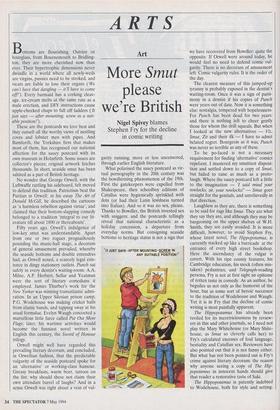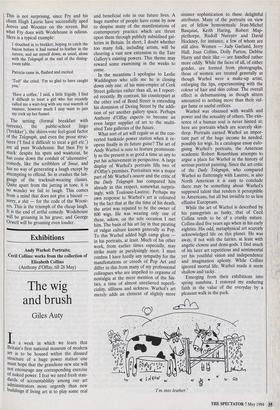ARTS
Art
More Smut
please we're British
Nigel Spivey blames Stephen Fry for the decline in comic writing Bottoms are flourishing. Outsize or hourglass, from Bournemouth to Bridling- ton, they are more cherished now than ever. Their hypertrophic dimensions never dwindle in a world where all newly-weds are virgins, pussies need to be stroked, and vicars are liable to lose their organs ('We can't have that dangling — it'll have to come off"). Every barmaid has a corking cleav- age, ice-cream melts at the same rate as a male erection, and DIY instructions cause apple-cheeked chaps to fall off ladders (it just says — after mounting, screw in a suit- able position!').
These are the postcards we love best and they outsell all the worthy views of nestling coves and lobster men with pipes. And Bamforth, the Yorkshire firm that makes most of them, has recognised our national affection for the saucy postcard with its own museum in Holmfirth. Some issues are collector's pieces; original artwork fetches thousands. In short, seaside smut has been saluted as a part of British heritage.
No wonder that George Orwell, with the Luftwaffe rattling his sideboard, felt moved to defend this tradition. Patriotism beat the Puritan in Orwell: in his essay The Art of Donald McGill, he described the cartoons as 'a harmless rebellion against virtue', and claimed that their bottom-slapping comedy belonged to a tradition 'integral to our lit- erature till about 1800 or thereabouts'.
Fifty years ago, Orwell's indulgence of low-key smut was understandable. Apart from one or two rogues prognathously pounding the music-hall stage, a decorum of general amusement prevailed, whereby the seaside bottoms and double entendres had, as Orwell noted, a scarcely legal exis- tence in dingy stationery outlets. Punch sat safely in every dentist's waiting-room: A.A. Milne, A.P. Herbert, Sellar and Yeatman were the sort of literary comedians it employed. James Thurber's work for the New Yorker was winning transatlantic admi- ration. In an Upper Silesian prison camp, P.G. Wodehouse was making cricket balls from elastic bands, and tapping away at his usual formulae. Evelyn Waugh concocted a marvellous little farce called Put Out More Flags; later, his wartime activities would become the funniest novel written in English this century, the Sword of Honour trilogy.
Orwell might well have regarded this prevailing literary decorum, and concluded, in Orwellian fashion, that the predictable vulgarity of the seaside postcard spoke for an 'alternative' or working-class humour. Greasy breakfasts, warm beer, tattoos on the fist: why should these not claim their own attendant barrel of laughs? And in a sense Orwell was right about a vein of vul- garity running, more or less uncensored, through earlier English literature.
What polarised the saucy postcard as vir- tual pornography in the 20th century was the bowdlerising phenomenon of the 19th. First the gatekeepers were expelled from Shakespeare, then schoolboy editions of Catullus were hygienically sprinkled with dots (or had their Latin levklness turned into Italian). And so it was no sex, please. Thanks to Bowdler, the British invested sex with sniggers: and the postcards tellingly reveal that national characteristic as a holiday concession, a departure from everyday norms. But consigning seaside bottoms to heritage status is not a sign that we have recovered from Bowdler: quite the opposite. If Orwell were around today, he would feel no need to defend comic vul- garity. There is no decorum of amusement left. Comic vulgarity rules. It is the order of the day.
The clearest measure of this jumped-up tyranny is probably exposed in the dentist's waiting-room. Once it was a sign of parsi- mony in a dentist if his copies of Punch were years out of date. Now it is something else: nostalgia, tempered with hopelessness. For Punch has been dead for two years: and there is nothing left to cheer gently those for whom the drill squeals. But when I looked at the new alternatives — Viz, Smut, Zit and their ilk — I have to admit belated regret. Bourgeois as it was, Punch was never so terrible as any of these.
To be po-faced is not a necessary requirement for finding 'alternative' comics repellent. I mustered my smuttiest disposi- tion and settled down to a copy of Smut, but failed to raise as much as a proto- laugh. Where the saucy postcard left a little to the imagination — 7 said mind your rowlocks, sir, your rowlocks!' — Smut goes straight for the genitals, and unrelievedly in that direction.
Laughless as they are, there is something to be said for rags like Smut. They are what they say they are, and although they may be burgeoning on the upper shelves of W.H. Smith, they are easily avoided. It is more difficult, however, to avoid Stephen Fry, whose latest novel, The Hippopotamus, is currently stacked up like a barricade at the entrance of every high street bookshop. Here the ascendancy of the vulgar is covert. With his ripe county features, his Cambridge education, his mock (often mis- taken) pedantries, and Telegraph-reading persona, Fry is not at first sight an epitome of rotten taste in comedy. As an author, he beguiles us not only as the humorist of the hour, but as some sort of heroic successor to the tradition of Wodehouse and Waugh. Yet it is in Fry that the decline of comic writing is most painfully apparent.
The Hippopotamus has already been reviled for its meretriciousness by review- ers in this and other journals, so I need not play the Mary Whitehouse (or Mary Shite- house, as Smut so cleverly calls her) to Fry's calculated excesses of foul language, bestiality and Catullan sex. Reviewers have also pointed out that it is not funny either. But what has not been pointed out is Fry's crime against literary decorum: the reason why anyone seeing a copy of The Hip- popotamus in innocent hands should give that reader a restorative taste of Saki.
The Hippopotamus is patently indebted to Wodehouse, both for style and setting.
This is not surprising, since Fry and his chum Hugh Laurie have successfully aped Jeeves and Wooster on the screen. But what Fry does with Wodehouse is odious. Here is a typical example:
I slouched in to brekker, hoping to catch the bacon before it had turned to leather in the tureen, and sat myself down, as usual, alone with the Telegraph at the end of the dining- room table.
Patricia came in, flushed and excited.
`Ted!' she cried. `I'm so glad to have caught you.'
`Have a coffee,' I said, a little frigidly. I find it difficult to treat a girl who has recently called me a wart-hog with any real warmth of manner, however much I may want to jam my cock up her funnel.
The setting (formal breakfast with
tureens), the public-school lingo (`brekker'), the shires-vote feel-good factor of the Telegraph, and even the prose struc- tures CI find it difficult to treat a girl etc.') are all pure Wodehouse. But then Fry is stuck: despite his spats and waistcoat, he has come down the conduit of 'alternative' comedy, like the scribblers of Smut, and has no way of generating a laugh except by attempting to offend. So in crashes the lan- guage of the tracksuit-wearing classes. Quite apart from the jarring in tone, it is no wonder we fail to laugh. This comes from a mind that does not give a biscuit Sorry, a shit — for the code of the Woost- ers. This is the triumph of the cheap laugh. It is the end of artful comedy. Wodehouse will be groaning in his grave; and George Orwell will be groaning even louder.



















































 Previous page
Previous page